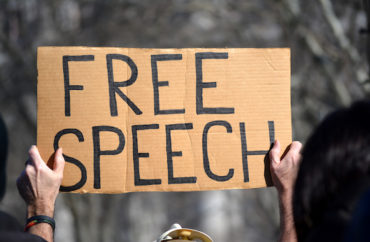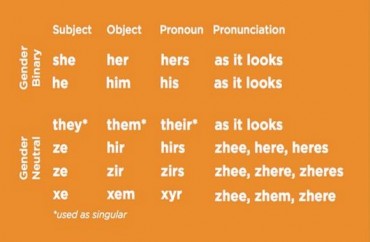
‘On a collision course with the First Amendment rights of university members’
Several experts in constitutional freedom of speech have raised red flags about the University of Minnesota’s proposed new policy to impose strict penalties for refusing to refer to someone by his or her chosen gender pronouns.
“Equity and Access: Gender Identity, Gender Expression, Nouns and Pronouns,” as currently drafted, states that professors and students are expected “to use the names, gender identities, and pronouns specified to them by other university members.” Sanctions for refusing to use someone’s chosen pronouns could result in “disciplinary action up to and including termination from employment and academic sanctions up to and including academic expulsion.”
Walter Olson, a senior fellow at the Cato Institute’s Robert A. Levy Center for Constitutional Studies, told The College Fix the policy, if approved, “is on a collision course with the First Amendment rights of university members.”
“As a public institution with an educational mission to uphold, Minnesota can appropriately make some demands of its members, such as respecting norms of collegiality, refraining from insult, observing consistent standards in filling out paperwork, and so forth,” Olson told The Fix via email.
“But this does not constitute a blank check to police and punish language use generally, especially not in politically charged areas of speech, and most especially when the policy departs from viewpoint neutrality to side with some controversial views over others.”
Reached via email, Terence Pell, president of the Center for Individuals Rights, told The Fix that the policy “raises serious First Amendment concerns.”
 “It is one thing for the state to prohibit certain words that are incendiary on their face. It is quite a different thing for the state compel the utterance of mandated pronouns, particularly if such usage runs counter to an individual’s religious or personal convictions,” Pell said. “Under the First Amendment, compelled speech requires a stronger justification than what is required to prohibit speech.”
“It is one thing for the state to prohibit certain words that are incendiary on their face. It is quite a different thing for the state compel the utterance of mandated pronouns, particularly if such usage runs counter to an individual’s religious or personal convictions,” Pell said. “Under the First Amendment, compelled speech requires a stronger justification than what is required to prohibit speech.”
Samantha Harris, vice president for policy research at the Foundation for Individual Rights in Education, said that the proposal is “vaguely worded in a way that does raise free speech concerns.”
“The problem is twofold: first, the policy prohibits ‘harassment’ without actually defining the term, leaving students uncertain as to what might be punishable; and second, the introduction to the policy provides that university members ‘are expected’ to use people’s preferred pronouns, opening the door to the possibility that a failure to do so might be treated as harassment,” Harris told The Fix.
Though the policy is “not as restrictive, on its face, as some have suggested,” she argued, “it certainly needs further revision to ensure that it does not have a chilling effect on free speech and is not used to punish protected speech.”
Olson said that the university has a high bar to meet for compelling such speech.
“Before presuming to force university members to mouth or endorse politically controversial language as a condition of keeping their jobs or remaining enrolled, the university must show that such coerced expression is essential to its functioning as an educational institution. It has not, and I suspect cannot, made such a showing,” he said.
Reached via email, campus spokesman Emma Bauer told The Fix: “We believe concerns around free speech are unfounded and based on extreme examples of implementation of the draft policy. We have confidence that our thorough consultative process will result in a practical policy that will consider the needs, rights and safety of all of our community members.”
Olson said he believes the policy, if challenged on legal grounds, will not stand up.
“It is a legitimate purpose to protect transgender members of the University of Minnesota community from purposeful insult or breach of privacy, but this draft goes far beyond that. I predict that unless altered, it will not fare well in court,” he said.
MORE: For $5, this free-speech group will help you sue your university for censorship
MORE: University promises ‘disciplinary action’ for students who engage in ‘hateful demonstrations’
IMAGE: Christopher Penler / Shutterstock.com
Like The College Fix on Facebook / Follow us on Twitter






Please join the conversation about our stories on Facebook, Twitter, Instagram, Reddit, MeWe, Rumble, Gab, Minds and Gettr.